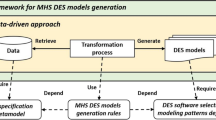Abstract
Recent advances in computing have allowed simulation to be used as a source of data in the real-time control of logistics systems such as Material Handling Systems (MHS). For a real-world MHS, in development by Lödige Industries GmbH, Germany, we demonstrate the benefit of generating data offline using a parametrized simulation model that real-time operational control is based on. The data consist of mappings of control situations to optimal actions respectively. Our approach allows for self-adaptation of the simulation by observing current system parameters that are fed into the model. The control automatically triggers regeneration when necessary, detects changes in the system and also proactively anticipates them, resulting in consistently high performance. We furthermore use a simulation-based look-ahead method to consider uncertainties when evaluating alternative actions. Evaluation results show a significant increase in system performance compared to fixed application of a control action and demonstrate the benefits of the self-adaptive properties.










Similar content being viewed by others
References
Armstrong J (2001). Principles of Forecasting: A Handbook for Researchers and Practitioners. International Series in Operations Research & Management Science. Springer: Heidelberg, Berlin, New York.
Aufenanger M, Dangelmaier W, Laroque C and Rüngener N (2008). Knowledge-Based Event Control for Flow-Shops Using Simulation and Rules. Institute of Electrical and Electronics Engineers, Inc: Piscataway, NJ.
Beierle C and Kern-Isberner G (2008). Methoden Wissensbasierter Systeme: Grundlagen, Algorithmen, Anwendungen. Vieweg+Teubner: Wiesbaden.
Bongard J, Zykov V and Lipson H (2006). Resilient machines through continuous self-modeling. Science 314 (5802): 1118–1121.
Cormen TH, Leiserson CE, Rivest RL and Stein C (2009). Introduction to Algorithms, Third Edition. 3rd edn. The MIT Press: Boston, MA.
Dangelmaier W and Laroque C (2007). d3fact insight—Immersive Ablaufsimulation von richtungsoffenen und wahlweise zeitorientierten Materialflussmodellen. Industrie Management 2: 73–76.
Hodges Jr JL and Lehmann EL (1952). The use of previous experience in reaching statistical decisions. The Annals of Mathematical Statistics 23: 396–407.
Klaas A, Laroque C, Fischer M and Dangelmaier W (2011). Simulation aided, knowledge based routing for agvs in a distribution warehouse. In: Jain S, Creasey R, Himmelspach J, White KP and Fu MC (eds), Proceedings of the 2011 Winter Simulation Conference, Institute of Electrical and Electronics Engineers, Inc.: Piscataway, NJ, pp 1673-1684.
Kwak C and Yih Y (2004). Data-mining approach to production control in the computer-integrated testing cell. IEEE Transactions on Robotics and Automation 20 (1): 107–116.
Laux H (2005). Entscheidungstheorie. Springer-Lehrbuch. Springer: Heidelberg.
Müller-Schloer C, Schmeck H and Ungerer T (2011). Organic Computing—A Paradigm Shift for Complex Systems. Springer Basel AG: Basel.
Piramuthu S, Raman N, Shaw MJ and Park SC (1993). Integration of simulation modeling and inductive learning in an adaptive decision support system. Decision Support Systems 9 (1): 127–142.
Prothmann H, Rochner F, Tomforde S, Branke J, Muller-Schloer C and Schmeck H (2008). Organic control of traffic lights. In: Rong C, Jaatun MG, Sandnes FE and Yang LT (eds). Proceedings of the 5th International Conference on Autonomic and Trusted Computing, ATC’ 08, Springer-Verlag: Berlin, Heidelberg, pp 219-233.
Ramsey CL and Grefenstette JJ (1994). Case-based anytime learning. In: Case Based Reasoning: Papers from the 1994 Workshop, Technical Report WS-94-07, AAAI Press: Menlo Park, CA, pp 91–95.
Russell S and Norvig P (2009). Artificial Intelligence: A Modern Approach. Prentice-Hall Press: Upper Saddle River, NJ.
Sakakibara K, Fukui Y and Nishikawa I (2008). Genetics-based machine learning approach for rule acquisition in an agv transportation system. In: Pan JS, Abraham A and Chang C-C (eds). International Conference on Intelligent Systems Design and Applications, Vol. 3, Kaohsiung, China, pp 115–120.
Wuensche M, Mostaghim S, Schmeck H, Kautzmann T and Geimer M (2010). Organic computing in off-highway machines. In: Weyns D, Malek S, Andersson J and Schmerl B (eds). Proceedings of the Second International Workshop on Self-organizing Architectures, SOAR’ 10, ACM: New York, NY, pp 51–58. doi:10.1145/1809036.1809048.
Acknowledgements
Note—This paper is a revised and expanded version of a paper entitled Simulationsgestützte, Selbstadaptierende Wissensbasierte Steuerung von logistischen Systemen presented at 15th ASIM Dedicated Conference Simulation in Production and Logistics, Paderborn, Germany, 9–11 October 2013.
Author information
Authors and Affiliations
Corresponding author
Rights and permissions
About this article
Cite this article
Klaas, A., Laroque, C., Renken, H. et al. Using simulation as an adaptive source of knowledge for the control of material handling systems. J Simulation 10, 103–112 (2016). https://doi.org/10.1057/jos.2015.26
Received:
Accepted:
Published:
Issue Date:
DOI: https://doi.org/10.1057/jos.2015.26




